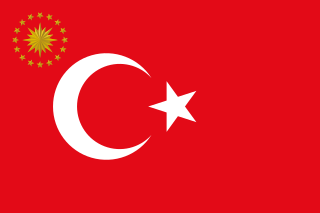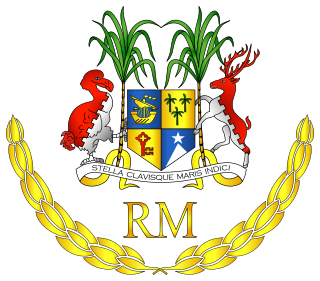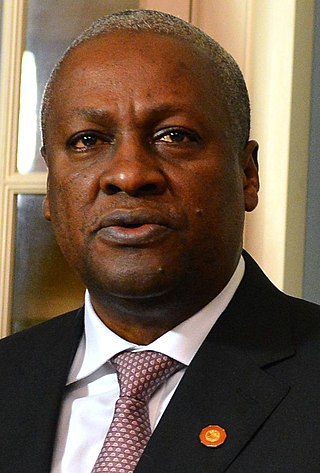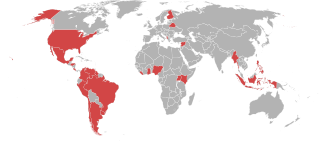
An oath of office is an oath or affirmation a person takes before assuming the duties of an office, usually a position in government or within a religious body, although such oaths are sometimes required of officers of other organizations. Such oaths are often required by the laws of the state, religious body, or other organization before the person may actually exercise the powers of the office or organization. It may be administered at an inauguration, coronation, enthronement, or other ceremony connected with the taking up of office itself, or it may be administered privately. In some cases it may be administered privately and then repeated during a public ceremony.

Article Two of the United States Constitution establishes the executive branch of the federal government, which carries out and enforces federal laws. Article Two vests the power of the executive branch in the office of the President of the United States, lays out the procedures for electing and removing the President, and establishes the President's powers and responsibilities.

Politics of Ghana takes place in a framework of a presidential representative democratic republic, whereby the president of Ghana is both head of state and head of government, and of a two party system. The seat of government is at Golden Jubilee House. Executive power is exercised by the government. Legislative power is vested in both the government and Parliament. The judiciary is independent of the executive and the legislature.

The president of the Republic of China, also known as the president of Taiwan, is the head of state of the Republic of China, commonly known as Taiwan, as well as the commander-in-chief of the Republic of China Armed Forces. Before 1949 the position had the authority of ruling over Mainland China, but after communist victory in the Chinese Civil War, the remaining jurisdictions of the ROC have been limited to Taiwan, Penghu, Kinmen, Matsu, and smaller islands.

The president of Turkey, officially the president of the Republic of Türkiye, is the head of state and head of government of Turkey. The president directs the executive branch of the national government and is the commander-in-chief of the Turkish military. The president also heads the National Security Council.

The president of the Arab Republic of Egypt is the executive head of state of Egypt and the de facto appointer of the official head of government under the Egyptian Constitution of 2014. Under the various iterations of the Constitution of Egypt following the Egyptian Revolution of 1952, the president is also the supreme commander of the Armed Forces, and head of the executive branch of the Egyptian government.

The president of the Republic of Ghana is the elected head of state and head of government of Ghana, as well as commander-in-chief of the Ghana Armed Forces. The current president of Ghana is John Mahama, who won the 2024 presidential election against then vice president, Mahamudu Bawumia, by a margin of 14.94%. He was sworn into office on 7 January 2025.

The president of the Republic of Mauritius is the head of state of the Republic of Mauritius. Mauritius is a parliamentary republic, and the president functions as a ceremonial figurehead, elected by the National Assembly as set out by the Constitution of Mauritius. The current office-holder is Dharam Gokhool. He was elected by the National Assembly on 6 December 2024. The president's official residence is the State House.

The president of Nigeria, officially the president of the Federal Republic of Nigeria, is the head of state and head of government of the Federal Republic of Nigeria. The president directs the executive branch of the Federal Government and is the commander-in-chief of the Nigerian Armed Forces.

The oath of office of the president of the United States is the oath or affirmation that the president of the United States takes upon assuming office. The wording of the oath is specified in Article II, Section One, Clause 8, of the United States Constitution, and a new president must take it before exercising or carrying out any official powers or duties.

The president of Benin is both head of state and head of government in Benin. The Cabinet of Benin is under the authority of the President, and serves to advise and help formulate strategies. It also liaises with ministries and other government institutions.

The vice president of the Philippines is the second-highest official in the executive branch of the Philippine government and is the first in the presidential line of succession. The vice president is directly elected by the citizens of the Philippines and is one of only two nationally elected executive officials, the other being the president.

The vice president of Nigeria is the second-highest official in the executive branch of the federal government of Nigeria, after the president of Nigeria, and ranks first in the presidential line of succession. Officially styled Vice President of the Federal Republic of Nigeria, the vice president is directly elected together with the president to a four-year term of office.

John Dramani Mahama is a Ghanaian politician who has served as President of Ghana since 7 January 2025. He previously served in that post from 24 July 2012 to 7 January 2017 and as vice president from January 2009 to July 2012. He took office as president for the first time on 24 July 2012, following the death of his predecessor, John Atta Mills.

The president of the Republic of Indonesia is the head of state and head of government of the Republic of Indonesia. The president is the leader of the executive branch of the Indonesian government and the supreme commander of the Indonesian National Armed Forces and the Indonesian National Police. Since 2004, the president and vice president have been directly elected to a five-year term, once renewable, allowing for a maximum of 10 years in office. The current president of Indonesia is Prabowo Subianto, who assumed office on 20 October 2024.

The president of Nepal is the head of state of Nepal and the commander-in-chief of the Nepalese Armed Forces.

The president-elect of the United States is the candidate who has presumptively won the United States presidential election and is awaiting inauguration to become the president. There is no explicit indication in the U.S. Constitution as to when that person actually becomes president-elect, although the Twentieth Amendment uses the term "president-elect", thereby giving the term constitutional basis. It is assumed the Congressional certification of votes cast by the Electoral College of the United States – occurring after the third day of January following the swearing-in of the new Congress, per provisions of the Twelfth Amendment – unambiguously confirms the successful candidate as the official "president-elect" under the U.S. Constitution. As an unofficial term, president-elect has been used by the media since at least the latter half of the 19th century and was in use by politicians since at least the 1790s. Politicians and the media have applied the term to the projected winner, even on election night, and very few who turned out to lose have been referred to as such.

General elections were held in Ghana on 7 December 2016 to elect a President and all 275 Members of Parliament. They had originally been scheduled for 7 November 2016, but the date was later rejected by Parliament. Former foreign minister Nana Akufo-Addo of the opposition New Patriotic Party was elected President on his third attempt, defeating incumbent President John Mahama of the National Democratic Congress.

Since the independence of Bangladesh, the presidential election process has been changed several times due to both the presidential and parliamentary arrangements. According to the Second Schedule to the Constitution of 1972, the president of the parliament used to be elected by a secret vote. Later, according to the fourth amendment to the constitution, the provision of the direct election system of presidential election was introduced. But soon after 12th Amendment to the Constitution, the provision of presidential elections through an indirect election was introduced after the parliamentary system was installed. At present, the president is elected by an indirect election by the members of parliament as per Article 48 of the Constitution.

A natural-born-citizen clause is a provision in some constitutions that certain officers, usually the head of state, must be "natural-born" citizens of that state, but there is no universally accepted meaning for the term natural-born. The constitutions of a number of countries contain such a clause but may define or interpret the term natural-born citizen differently. Many countries specify citizenship since birth as a requirement to hold certain offices. This is often described using the natural born phraseology and sometimes further qualified as requiring physical birth within the country's territory and/or requiring that one or both natural parents be a citizen of the country at the time of birth.





























